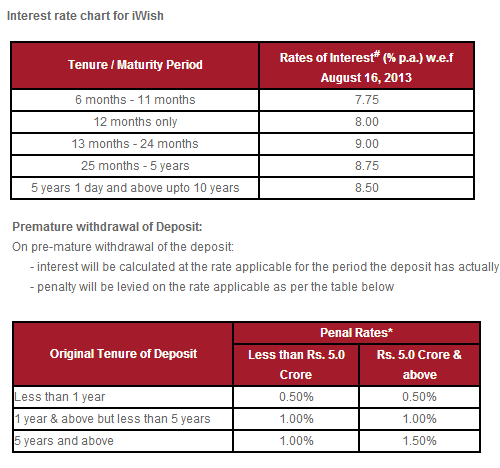Review of iWish Recurring Deposit from ICICI Bank : Jagoinvestor |
|
Posted: 25 Dec 2013 09:58 PM PST
Around December last year, ICICI Bank launched a flexible Recurring Deposit scheme called “iWish”. Customers with an ICICI savings account and who have access to Internet banking can use the iWish facility. Here’s how
 Where iWish really innovates, is by bringing a social networking aspect into the picture. Users have the ability to share their goals (and the money required to achieve them) on their Facebook account and friends and family can then contribute money to the goal if they wish. By getting users to make a public declaration of their goal, the scheme hopes to prompt greater accountability in individual financial decisions. To learn more about ICICI iWish Scheme, please watch the video below. How its different from normal Recurring Deposit ?Compared to a standard Recurring Deposit, the iWish scheme does not make it compulsory for users to make payments on a fixed date and also gives them the power to categorize savings into goals – which is a more human way to visualize and save your money.Personally, I see iWish as a mechanism to define goals and save for them through Recurring Deposits. While standard Recurring Deposits just help save money for an unlabeled goal, iWish helps you define and prioritize your goals – helping you decide which goal to save for first. It also helps build a focused saving approach as once someone defines a goal, they are more likely to be serious about achieving it. The scheme is clearly going to benefit the young generation, who are new to investing. For a generation who rely a lot on visual stimuli, the ability to see defined goals and a visual image of progress towards that goal (e.g. 34% of your ‘new car’ goal has been achieved) is a huge plus. Fine Prints and things to knowWhile, on the whole, the iWish Scheme is good, there are few things one should be aware of to avoid a mismatch with expectations.
Disadvantage of iWish from ICICIBy now, you must be wondering what the downsides of the iWish scheme are? Simply put, it is the problem of “manual intervention”.I am convinced that it takes a great degree of resolve and discipline to properly manage one’s personal finance and investments. Unless the saving process is automated, people are tempted to be a little relaxed about saving in every period. While iWish touts its ‘flexibility’ as an innovative feature, in real life it might not help, as people are more likely to stop ‘voluntarily’ paying into their goals after 2-3 contributions. With a traditional recurring deposit, the process of investing is compulsory and forced on you and in essence, you are compelled to make payments on a fixed date. Furthermore, the knowledge that there is an auto-debit leads you to ensure the monies are there in the account on the designated date. All this means that over 1-2 years, the Recurring Deposit really works and creates the money pool you need. While iWish is a fancy product, I do not see it as an improvement over the traditional Recurring Deposit. Only in selected conditions and situations, iWish seems to work better than normal Recurring Deposit. An example would be when the investor’s income is not stable (one does not know if the bank account will really have the required balance on a certain date). For all other cases, I would prefer using traditional Recurring Deposits. Choose a goal, fix the amount, divide it by number of months and just start the RD for that amount. That should get the job done without needing my involvement every month. |
No comments:
Post a Comment